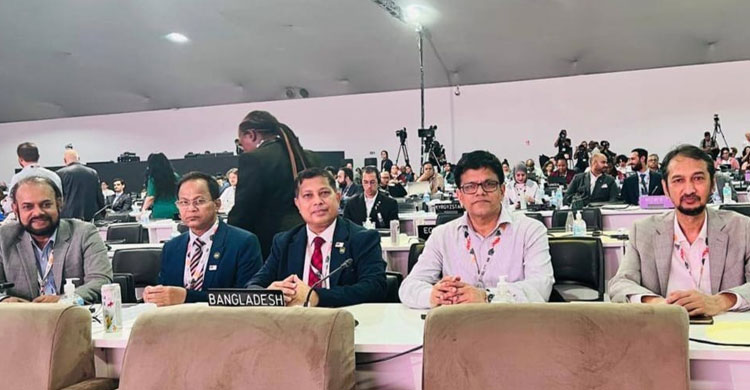Bangladesh Calls for Justice-Driven Climate Action at COP30 in Belém


Bangladesh emphasized justice, ambition, and urgent global solidarity in the face of escalating climate impacts at COP30 in Belém, Brazil. Mohammad Navid Shafiullah, Additional Secretary (Climate Change) of the Ministry of Environment, Forest and Climate Change, stated this while delivered Bangladesh’s National Statement yesterday.
Speaking at a moment when the world grapples with irreversible climate damage and a profound trust deficit in multilateralism, he reminded delegates that for Bangladesh, climate change is not an abstract threat but a daily reality. Extreme temperatures, cyclones, floods, sea-level rise, and riverbank erosion continue to displace millions, undermine biodiversity, and push vulnerable communities to the brink.
He added that Bangladesh confronts extreme climate events while simultaneously bearing the humanitarian burden of the Rohingya crisis—demonstrating how climate, conflict, and displacement multiply pressures on vulnerable nations.
Despite contributing less than 0.5% of global emissions, Bangladesh has chosen leadership over despair. Shafiullah highlighted that the country is advancing NDC 3.0, aligned with the Global Stocktake outcome, targeting 25% of electricity generation from renewables by 2035—five times higher than the current level. He noted that Bangladesh is operationalizing its National Adaptation Plan and investing heavily in locally led adaptation.
However, he cautioned that without predictable climate finance and accessible technology, climate-vulnerable countries cannot survive, as limited national budgets are diverted to disaster response at the expense of essential sectors like health and education.
Calling for decisive global action, he urged four pathways: perceiving climate action through the lens of justice by translating the ICJ advisory opinion into measurable accountability; strengthening public finance and ensuring that adaptation finance reaches at least USD 120 billion annually; scaling up grant-based adaptation finance and swiftly operationalizing the Loss and Damage Fund for vulnerable countries; and investing in Locally Led Adaptation and Nature-Based Solutions such as mangrove protection—including the Sundarbans—climate-resilient agriculture, and community-based flood-risk management.
He warned that the politicization and commercialization of climate initiatives have only deepened delays and escalated the cost of inaction. He concluded by declaring that COP30 will either become another missed opportunity accelerating climate collapse, or a turning point that redeems years of inertia. “In Belém,” he stated, “let courage rise, let justice lead, and let collective action begin—to build a safer planet for future generations.”
